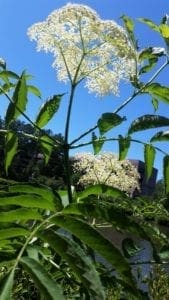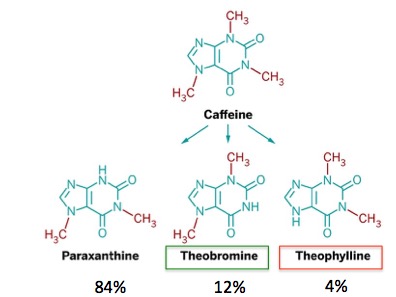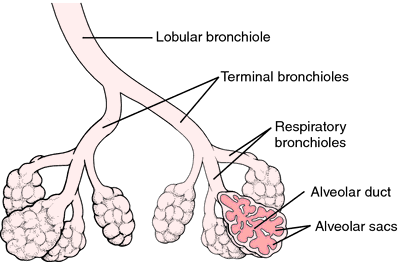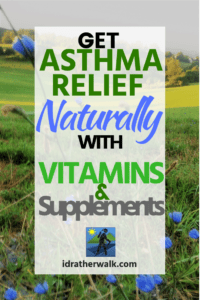Most recently updated July 7th, 2023
If you’ve read some of my other posts, you know that I’ve had asthma and have been fighting asthma my whole life.
In spite of allergy shots and prescribed inhalers and pills, my asthma got worse every year.

After a childhood full of midnight ER visits and college years laced with time in Intensive Care, I had complete respiratory failure as a young working adult, and spent several days unconscious on a ventilator.
After that event, the doctors could only advise that I take more daily medications and stay indoors in a controlled environment.
I realized then that the available asthma treatments would probably keep me alive, but would severely limit my life.
So, I moved across the country to escape the worst of my local airborne triggers – and got some breathing room 😉
Since then I’ve experimented with diet, exercise and supplements to find what might help reduce my symptoms and my use of most medications.
Through research plus trial and error, I’ve created a strategy that helps me breathe easier and stay healthy enough to do just about anything I want to do!
In this post I tell you about the vitamins and supplements available and the ones I’ve used – and mostly still use – that appear to help asthma.
For inspiration I’m also sharing more photos of beautiful places I’ve been able to hike, and beautiful plants and animals that haven’t made me wheeze 🙂
If you’re looking for additional (non-medical) ways to minimize or even eliminate asthma symptoms, maybe this strategy could help you, too!

WARNING: This is a long article, packed full of information.
I tell you what the research says, and what I’ve done that works for me.
Hopefully, it will give you some ideas of vitamins and supplements that may work for you, too.
A quick review….
What is Asthma?
Asthma can affect the breathing of children or adults, and symptoms range from fairly mild to life-threatening.
There is no cure, but some people do grow out of it, and medical drugs are available that treat the symptoms.

Asthma affects about 300 million people worldwide and it’s estimated that an additional 100 million will be affected by 2025.
In the U.S., asthma affects more than 25 million people.
Many people with asthma do not feel sick, and can be very active until they run into something that triggers an asthmatic reaction.
WHAT ARE THE symptoms of asthma?
There are three main symptoms:
-
-
- Constriction of bronchial tubes (airways)
- Inflammation of lung tissue
- Thick mucus in the lungs
-
ASTHMA Treatment vs. ASTHMA Prevention
Asthma is a strange disease because many asthmatics feel fine most of the time.
But if you run into a trigger, you can be in serious trouble within minutes and it may take hospitalization to break the cycle.

Even when you treat an attack successfully, lingering irritation can make your lungs more sensitive, and make you more likely to have another attack in the near future.
That’s where ongoing strategies for prevention – like maintenance medications, supplements, diet, and exercise come in.
It’s far better to prevent an asthma attack from ever happening, than to have to use emergency measures to treat a sudden attack.

For the purpose of this post, I’m only identifying vitamins and supplements that may reduce asthma symptoms, treat a mild asthma event or prevent an attack altogether.
There are other facets of asthma management like environment, diet, exercise, and medication that would go along with taking supplements, but they are not discussed in this post.
Follow this link to read more about my Anti-Asthma Diet. You can also read about how to reduce allergens in your home or a quick cleaning plan to reduce indoor allergens during the holidays.
NOTE: I am not a medical practitioner, and speak only from my own research and personal experience. As always, consult your doctor before making substantial changes in your medications or eating habits.
Some of my posts contain affiliate links. If you make a purchase through an affiliate link, I will receive a small payment at no additional cost to you. As an Amazon Associate, and other marketing affiliations, I earn from qualifying purchases. I do not get paid for recommendations, all opinions on this site are my own. See full Disclosure page here.

Is Asthma an Auto-Immune Disease?
At first look, asthma, allergies and auto-immune diseases like multiple sclerosis and rheumatoid arthritis don’t seem to have anything in common.
-
-
- With an autoimmune disease, your immune system attacks your own body – because it identifies your own cells as “invaders”.
- With allergies, the “invaders” are everyday things outside of your own body – like peanuts, pollen, shellfish, smoke or even pet dander.
-
Though more complex than an allergic reaction, asthma – like an allergy – is also an immune system response to what the body perceives as an “invader”.
But asthma may be triggered by an allergic reaction to something outside the body OR by something that is a part of your own body’s tissues.

In some cases, the asthma may even be be triggered by both.
“They’re all connected,” Erik Wambre, PhD, principal investigator of the Benaroya Research Institute (BRI), says. “It’s a mistake of your body’s own immune system, whether it’s autoimmunity or allergy.”
But the body reacts in a different way to these two types of attacks.
-
-
- In an autoimmune response, tissue destruction occurs.
- With allergies, the immune system overreacts to harmless allergens.
-
An asthmatic reaction doesn’t destroy tissues, but restricts and sometimes completely shuts down the intended function in lung tissues.

Medical Treatment for Inflammation
Inflammation is usually the first sign of an autoimmune disease, and is also a major symptom of asthma.
In both cases, some form of corticosteroids are the most prescribed drug for inflammation control.
About Steroid Treatments
Most people with persistent asthma or auto-immune disease are prescribed long-term corticosteroid control medications to be taken daily for prevention, even when they don’t have symptoms.
Because preventive corticosteroids are used over the long term, side effects can be a concern.
As it turned out, I’m sensitive to even the relatively small doses of steroids in inhalers, so I opted not to take them as a preventive medicine.
At that time, there were no other medical options for long-term treatment of asthmatic inflammation.
That meant I needed to find some means other than steroids to control or reduce my lung inflammation, which is why I turned to vitamins and supplements.

Vitamins and Supplements
There’s evidence that diets higher in vitamins C, D, E, beta-carotene, flavonoids, magnesium, selenium, and omega-3 fatty acids may help reduce inflammation and decrease rates of asthma.
Below are a list of those and other vitamins that have been found to reduce inflammation or otherwise help support lung function.
Vitamins that Fight Asthma
It’s always better to get vitamins from food sources, but many times that’s not possible. Supplements in pills, capsules, or other forms are a good substitute.
Vitamin A – A 2018 study found that children with asthma typically had lower levels of vitamin A in their blood than children without asthma.
Food Sources of vitamin A: carrots, cantaloupe, sweet potatoes, leafy greens, such as romaine lettuce, kale, spinach and broccoli.
Vitamin B6 – Foods rich in vitamin B6 (pyridoxine) should be part of any anti-asthma diet. Studies have found pyridoxine to dramatically reduce the intensity and frequency of asthma attacks. Pyridoxine plays a critical role in the production of molecules that help relax bronchial smooth muscle tissue.
Food Sources of Vitamin B6 – a wide range of foods, bananas being a very rich source of this vitamin.

Vitamin C – With it’s strong antioxidant properties, vitamin C (ascorbic acid) is highly effective at neutralizing free radicals that can cause contraction of airway smooth muscles.
Studies have also shown high levels of vitamin C to act as an antihistamine in the body. (Histamine is a chemical produced by the body, that can increase inflammation in asthmatics and cause constriction of smooth muscles.)
Food sources of Vitamin C include- Citrus fruits such as orange, kiwi, lemon, grapefruit, cantaloupe, strawberries and vegetables such as broccoli, cauliflower, and Brussels sprouts.
Vitamin E is another antioxidant that can help alleviate asthma symptoms such as shortness of breath, coughing, and wheezing.
Food sources of Vitamin E – Fatty fish such as salmon, nuts, seeds, avocado, vegetable oils and wheat germ. Some dark leafy greens.
Vitamin C and vitamin E protect each other and are more effective when consumed together.

Calcium, Magnesium and Potassium – Studies have shown that calcium and magnesium may decrease the risk of asthma and increase lung function in people who have asthma. Magnesium is also needed to maintain adequate levels of potassium, another mineral that has been associated with improved lung function and a reduced incidence of asthma.
Food sources – Calcium and Magnesium may be found in dairy products and eggs. Potassium is found in a variety of foods, including bananas, root vegetables and green beans.
Vitamin D – Getting enough vitamin D may help reduce the number of asthma attacks in children ages 6 to 15, according to the Vitamin D Council. Spending even a few minutes outdoors in the sun can increase your vitamin D.
Sources of vitamin D – sunshine, salmon, milk and fortified milk, fortified orange juice, eggs. Beef liver and cheese also have some amount of vitamin D.
MY DAILY VITAMINS
I do try to get a lot of my vitamins from food, but frankly I just can’t eat that much! So here are the vitamins I take on a daily basis:
-
-
- Vitamins: Vitamin B Complex, Vitamin D, Vitamin C
- Minerals: Potassium, Calcium, Magnesium & Zinc
-

More About Vitamin D
You may have noticed a lot of focus on Vitamin D levels in your own checkups lately. They never used to focus on vitamin D, so what’s the deal?
-
- First, Vitamin D deficiency has been linked to a host of age-related health conditions and even overall mortality.
- Second, (but most important to me!) according to recent studies, Vitamin D might have direct anti-asthmatic effect.
Due to this relatively new information, Vitamin D is fast on its way to becoming the “number one vitamin.”
Is It Really a Vitamin?
Technically, Vitamin D is NOT a vitamin. Vitamins are micro-nutrients that the body uses in various processes.
Vitamin D is a pro-hormone, a substance that the body converts into a hormone.
That’s a technicality, but it does explain why the way Vitamin D works in the body is so mysterious.
Making Vitamin D

What happens is that sunlight (specifically UV-B radiation) hits your skin and reacts with some chemicals and then SHAZAM!!
You’ve got Vitamin D.
Seriously, what you need to remember is that 15 minutes of exposure to sunlight on your hands and face every day is plenty for your body to make enough vitamin D.
(During winter in colder climates you may need more exposure.)
What Good Does It Do?
We don’t know exactly how it works, but aside from reducing inflammation, Vitamin D seems to keep your blood pressure low and give the immune system a boost.
-
-
- We also know that vitamin D helps your bones absorb calcium (and calcium is what bones are made of).
- Research on vitamin D deficiency and depression, back pain and heart attacks all show that vitamin D has a larger role to play than just bone health.
- It’s even thought that autoimmune diseases like multiple sclerosis may be caused by vitamin D deficiency.
-
Types of Vitamin D

Two major forms of vitamin D are vitamin D2 and vitamin D3. Most supplements seem to focus on vitamin D3 (cholecalciferol).
Vitamin D3 is produced in response to sun exposure and is found in animal products, whereas vitamin D2 occurs in plants.
Who Is Deficient?
It’s estimated that 25% of U.S. adults have severe vitamin D deficiency.
Overall, 40% of men and 50% of women have a lower than healthy level of vitamin D.
The people most at risk are anyone who spends a lot of time indoors (the elderly or office workers) and people with darker skin – because dark skin absorbs less sunlight.
Vitamin D is extremely important for good health. As a hormone, it plays several roles in keeping your body’s cells healthy and functioning the way they should.
If you’re not getting outdoors much, and you don’t eat Vitamin D fortified foods like milk, you may want to take a Vitamin D supplement.

Anti-Inflammatory Supplements
Dietary supplements are popular plant-based supplemental or complementary treatment options for people with inflammatory diseases.
Almost 70% of prescription and OTC (Over the Counter) medicines – not just herbal supplements – are originally derived from plants and natural sources.
Medical researchers study the plants that have been traditionally used for treatments to identify the specific molecule that has therapeutic properties.
After undergoing various modifications in laboratories, the medicine is mass produced and marketed.
Dietary supplements are regulated under the Dietary Supplement Health and Education Act of 1994 (DSHEA), a different set of regulations than govern conventional foods and drugs.
Because of the DSHEA regulation, you can be sure dietary supplements are safe, if you follow dosing guidelines.
Here are a few of the best-known anti-inflammatory supplements and recommended dosage:
Boswellia – Boswellia extract is derived from the gum resin of the bark of the Boswellia tree, which grows in India. An ayurvedic herb, Boswellia has anti-inflammatory and analgesic properties.
Dosage –Available in pills or capsules; dose is 300-400mg 3x daily.

Bromelain– Bromelain is found in pineapple. It’s anti-inflammatory effect occurs when it alters leukocyte (white blood cell) migration and activation.
Dosage – Available as tablets or capsules; dose is 500-2000mg 3x daily between meals.
Chondroitin – Chondroitin is thought to reduce pain and have anti-inflammatory properties. The supplement may also improve joint function.
Dosage – Available as capsules, tablets, and powder. Typically, 800-1200mg daily, divided into two to four doses.
Fish Oil – Fish oil supplements are derived from the oils of cold water fish, including mackerel, salmon, herring, tuna, halibut, and cod. Fish oil is a source of omega-3 fatty acids (EPA and DHA). Omega-3s have an anti-inflammatory effect.
Dosage – Available as capsules or soft gels. The daily dose for rheumatoid arthritis is 3.8g EPA and 2g DHA.

Flax–The seed of the flax plant contains omega-3 and omega-6 fatty acids. Some of the fat in flaxseed oil converts to EPA and DHA, the active ingredients in fish oil.
Dosage – Available as capsules, oil, ground meal, or flour. Available in 1000 to 1300mg capsules, no typical dose stated.
Ginger –The dried or fresh root of the ginger plant. Shown to have strong anti-inflammatory properties, similar to some NSAIDs (nonsteroidal anti-inflammatory drugs). Ginger works by inhibiting chemicals that promote inflammation.
Dosage – Available in capsules, extract, powder, oils, and tea. Up to 2g of ginger in 3 divided doses daily or up to 4 cups of tea daily.
Quercetin – A chemical found in various foods, including apples, onions, teas, berries, and red wine. Quercetin blocks pro-inflammatory chemicals, such as leukotrienes (like some asthma meds).
Dosage – No recommended or usual dose. If you wish to try quercetin, consult your doctor or eat an apple 🙂
 Turmeric – The roots of the Turmeric plant, which is related to the ginger family, are dried to a powder that is used in foods, curries, and Ayurvedic medicine. Turmeric is recognized for its anti-inflammatory properties.
Turmeric – The roots of the Turmeric plant, which is related to the ginger family, are dried to a powder that is used in foods, curries, and Ayurvedic medicine. Turmeric is recognized for its anti-inflammatory properties.
Dosage – Available as capsules or spice. The usual dose for capsules is 400-600mg 3x daily, or 1 to 3 g of powdered root daily.
Local Honey – Using local honey as a natural sweetener has been proven to help reduce local allergens. Buy local to help with allergies (and support local farmers!). You could also drink Mead made from local honey.
Dosage – Sweeten to taste and drink responsibly 🙂
Licorice Root – Licorice has been used for thousands of years to treat bronchitis, common cough, and asthma. The natural chemicals in licorice act as an anti-inflammatory and soothe swollen airways. It also may act as an anti-histamine, like popular allergy medications. Licorice Root also has an aspirin like effect, which helps in the treatment of fevers and pain relief from headaches.
Dosage –None available. Traditional methods of taking Licorice Root include drinking it as a tea, chewing on the root (not recommended) and in capsule form. NOTE: Twizzlers won’t work…..
MY SUPPLEMENTS
As with vitamins, I try to get a lot of my supplements from food. I’ve also tried some of the above in pill form, but stopped taking them for whatever reason. Below are the supplements I take/have taken on a daily basis:
-
-
- Fish Oil: I took this for a while, but prefer to just eat fish.
- Turmeric: I couldn’t tell if this was doing anything, so stopped taking it.
- Ginger: I took this in capsule form for a while, but started eating candied Ginger as a treat instead.
- Honey: Yes, dear 🙂
-

Caffeine
Unlike most of the vitamins and supplements listed above, caffeine is not an anti-inflammatory. Caffeine is a bronchodilator – which means it can help relieve asthmatic constriction of the airways.
Caffeine is found in coffee, tea, cola drinks and cocoa, but seems to be more effective in the hot drinks coffee and tea.
Caffeine improves lung function for 2-4 hours after you drink it, but it’s not as strong or as fast-acting as medical rescue bronchodilators like albuterol.
Coffee
Another reason that coffee provides relief is that the caffeine in coffee can be converted into theophylline – a more effective asthma medication – by a metabolic process in the liver. (See metabolic diagram below.)
Theophylline is a bronchodilator drug (like albuterol) that opens up your airways to relieve asthmatic wheezing.
I was treated with theophylline for maintenance, along with rescue inhalers, as a child and young adult.

First used for asthma in 1922, Theophylline was the top treatment for asthma before the invention of inhalers that combine steroids and long-acting bronchodilators.
Small amounts of the drug are created by your body’s metabolic process, but a synthetic process is required to make effectively strong pills.

How much coffee would you need to drink to metabolize a typical daily dose of Theophylline (600mg)?
Let’s do the math:
-
-
- One cup of coffee contains 95 mg of caffeine.
- 4% of the caffeine is converted to 3.8 mg of Theophylline.
- 600mg (Theophylline daily dose) divided by 3.8mg = 158 cups of coffee.
-
So, you would have to drink 158 cups of coffee daily to get a therapeutic dose of Theophylline.
I’m pretty sure that if you drink 158 cups of coffee, you’ll have more than asthma to worry about… 🙂

But coffee really does help quickly treat wheezing caused by breathing cold air, or relieve exercise-induced asthma, before it becomes a worse attack.
I grew up drinking coffee therapeutically to relieve wheezing, and it helped me a lot.
That said, for a more serious problem you would need to use coffee in combination with something else.
Caffeine is also available in pill form, but I would only recommend taking those during Final Exams. Just kidding….. maybe 😉
Theobromine
I recently found myself looking for a new bronchodilator medicine when I couldn’t get my regular prescription inhalers due to supply chain issues.
I found Theobromine, a mild bronchodilator related to Theophylline, sold as an over-the-counter supplement in capsule form.
Theobromine is milder than Theophylline and is often found as one of the ingredients in so-called “fat burning” diet supplements. But it’s also sold in capsules on it’s own as a dietary supplement.
Theobromine, related to both caffeine and theophylline, is a natural stimulant found in some foods, such as cocoa and chocolate (made with cocoa).
So, what does it do?
Theobromine Benefits
Theobromine, like caffeine and theophylline, acts as a stimulant to give energy. It also helps to alleviate sleepiness, and increases concentration and focus.
Those are nice benefits, but for my purpose in fighting asthma symptoms, I’m more interested in it’s abilities as a vasodilator (widens the blood vessels) and bronchodilator (increases lung function).
This stimulant can also benefit heart health and can have a positive effect on mental health by promoting a feeling of calm.
Chocolate is good for your teeth, and so is Theobromine! It helps harden tooth enamel to reduce the appearance of stains on our teeth.

Okay, so sparkly white teeth aren’t required for good lung function, but I’ll take it as a bonus 🙂
There are also many theobromine benefits you can get without taking pills – just eat the healthiest kind of chocolate.

Stay Hydrated with Water
Water isn’t a vitamin or supplement, but it is a very important tool to use in prevention and treatment of asthma attacks.
In everyday life it’s healthy to drink plenty of water – all of your systems work better when hydrated.
As you know, one of the primary symptoms of asthma is thick mucus that clogs your lungs. Water will break down that mucus, which makes it thinner and easier to breathe through.
During an asthma attack, that thick mucus will also clog your bronchioles – the tiny branches at the end of your airways.

The mucus goes down the passageways to tiny air sacs called alveoli, which are the site of oxygen and carbon dioxide exchange in the respiratory system.
If you are dehydrated, the mucus will thicken even more and dry into hard plugs that will continue to block oxygen until you can clear them out.
Water helps thin mucus and soften the hardened plugs so they are easier to cough out.

You may also lose water through sweating from the exertion of rapid breathing during a severe prolonged asthma attack.
Higher body temperature, and the increased rate of respiration also contribute to dehydration.
I was astonished to find, during one Emergency Room visit, that I was not allowed to have water.
The Straight Poop – Digestive Supplements
Speaking of water, another thing good hydration helps with is regular poopage. This is a little indelicate, but everybody poops, right? 🙂
The primary purpose of the intestinal system is to absorb nutrients and distribute them to the rest of the body.
Recent studies have shown that the gut microbiome may also significantly impact our immune system, which is good news for people with conditions like rheumatoid arthritis and asthma.

For a healthy adult, food should spend no longer than 24 hours in the body before passing through the system.
But when the intestines are clogged due to dehydration (or any other reason), the immune system is compromised and the whole body becomes more susceptible to allergies and sensitivities.
The solution is to remove any “excess baggage” and restore immune system balance so the body can fight off irritants in a natural way.
I’ve never actually had any problems with poopage, but years ago – more than 15 years ago! – I got a feeling that something not-quite-right was going on in my gut. A gut feeling, if you will 😉
So I started taking an herbal supplement for digestive health. After taking it for a while, I noticed that my asthma seemed to be better.

In addition to the usual fibrous ingredients, this digestive supplement blend contains several herbs that are known to help with asthma:
-
-
- Kelp contains a balance of essential minerals and chlorophyll which reduces inflammation, and is helpful for asthma.
- Fennel is a natural antispasmodic, which is helpful when used with the intent of relieving asthma.
- Black Seed (Nigella sativa) is an anti-inflammatory by inhibition of histamine release and may be used for asthma therapy and prevention.
-
I don’t know whether it’s due to the anti-asthma action of the herbs, or just keeping a clean gut, but my asthma and general health have been improved.
CBD Oil and Capsules
CBD Oil – a derivative from the hemp plant – is a non-psychoactive cannabinoid that has recently become very popular.
It’s available in the form of oil, capsules, tinctures, balms, edibles and more.
Credited for everything from alleviating anxiety to improving sleep and relieving chronic pain, CBD is already in use for pediatric epilepsy, pain, inflammation, acne, asthma, and a host of other conditions.

CBD is also available in vape form, but please don’t do that – vaping is especially unsafe for asthmatics.
I classify CBD as a supplement rather than a medication, because it is very clearly plant-derived rather than synthetically created.
CBD works in the human body through the Endocannabinoid System.
What Is the Endocannabinoid System?
The word “endocannabinoid” comes from “cannabis,” and “endo” (short for “endogenous”) which means that it is produced naturally inside of your body. So Endocannabinoids are cannabis-like substances that occur naturally in our bodies.
The Endocannabinoid System (ECS) itself is made up of three parts:
-
-
- Endocannabinoids
- Receptors in the nervous system and around your body that endocannabinoids and cannabinoids bond with
- Enzymes that help break down endocannabinoids and cannabinoids
-
Not only is the ECS it a natural part of our bodies, it’s a crucial one.
Cannabinoid receptors are believed to be among the most plentiful in our central nervous system. Through those receptors, the ECS helps regulate a lot of important functions, including Immune function and Inflammation.
The ECS works with precision so that it only impacts what it needs to in your body.
For example, if your hormones are messed up, it will work to regulate them without altering your digestion or immune system.
CBD Oil Dosage

My advice is to start out with a relatively small dose of CBD oil to determine how your body reacts to it.
From there you can implement a systematic dosing pattern.
If you’re using CBD for chronic pain or inflammation, a dose of 5mg may be enough to get you started.
This dosage will allow you to gauge where you should go from there.
When using CBD oil for pain, many patients look for a “sweet spot” somewhere between 10-20 mg, taken 1-2 times a day or even up to three times a day when the pain is severe.
That said, you should also keep an eye on how long the effects of the CBD actually last. Some people find that taking a single dose daily might be more than enough to provide them with relief.
CBD Is Not For Everyone
I did kind of a dumb thing a few weeks ago. Well, actually the dumb thing had been going on for longer than that….
When I’m travelling in remote areas where there’s no access to power, cell signal, or filtered air, and I may not be able to stick to my usual diet, my emergency meds are of necessity different than when I’m home.
Specifically, I use anti-histamine pills and ibuprofen pills as an anti-inflammatory in a preventive way – and, if necessary, at high doses – until I can get back to a place where I can breathe filtered air, and have access to my normal anti-inflammatory tools.
I’ve been over-using Ibuprofen in short bursts for years as an anti-inflammatory to help with asthma, and it finally caught up with me.
I’d been travelling for a couple of months without many breaks, so was using my “contingency” meds to keep going.

The trouble was, there was record-breaking heat the whole time and I didn’t feel like eating – so there wasn’t much in my stomach but the meds.
After I returned home, I had severe pain in my abdomen for days, couldn’t eat and couldn’t sleep.
I was afraid to even drink water because putting anything in my stomach increased the pain.
So when I finally went to Urgent Care, they confirmed what I suspected: I had given myself an NSAID ulcer!
Obviously, you should try to avoid getting an NSAID ulcer 🙂
I had to stop taking Ibuprofen immediately. But then that left me without one of my emergency anti-inflammatory tools, and I needed to find a new one.
One of my hikers and some other friends recommended CBD, so I thought I’d give it a try.
After I healed for a bit, I started with 25mg capsule of CBD at night before bed and took it for a couple of weeks.
I can’t lie – I really didn’t like it. So I stopped taking it. 🙂
I couldn’t tell if it was helping with asthma – because it’s a preventive treatment, like steroid inhalers – and it made me feel strange, not like myself.
But it might work for you for pain or inflammation – as it has for several people I know.
And let me just say, nothing feels quite as good as the absence of pain, especially after you’ve been enduring it for a while.
The good thing is, if you don’t like it, CBD Oil only stays in your system for about 7 days.

A Caveat
When’s the Best Time to Take Vitamins?
The best time to take your vitamins depends on which vitamins you’re taking, and what health effects you hope to gain from taking them.
-
-
- The best time to take many vitamins and supplements is in the morning, with a meal.
- There are also a few supplements that may help you sleep better when taken shortly before bedtime.
-
Vitamins better taken in the morning include:
-
-
-
- Vitamin C
- Some B vitamins
- Vitamin D
- Coffee
-
-
Vitamins better taken near bedtime include:
-
-
-
- Vitamin B-3 (niacin)
- Magnesium
- CBD Oil
-
-
It’s generally better to take vitamin and mineral supplements with a meal, unless you’re advised differently by your doctor.
In fact, “fat-soluble” vitamins need to be taken in combination with a meal that contains some fat calories in order to provide any benefit.
That’s because they only dissolve (so they can be absorbed) when you take them along with some fat.
Some supplements, like CBD oil, might make you sleepy. In fact, one of the benefits of CBD oil is a good night’s rest.
Coffee, on the other hand, will perk you right up 😉

I hope this information about vitamins and supplements can help you in improving your breathing and your overall health!
To learn about how what you eat (or don’t) can also improve your asthma, read about my Anti-Inflammatory Asthma Diet.
To read more articles about how to live better and be more active with asthma and allergies, check out the Fitness and Wellness page.
If you have a question, drop me an email and I’ll reply as soon as I can. Thanks for stopping by – see you next time! LJ
To Get New Idratherwalk Posts
sent directly to your inbox (how convenient!) Click this Button
If you like this post, please share it!


LJ has spent much of her free time as a single Mom – and now as an empty-nester – hiking in the US and around the world. She shares lessons learned from adventures both local and in exotic locations, and tips on how to be active with asthma, plus travel, gear, and hike planning advice for parents hiking with kids and beginners of all ages. Read more on the About page.

